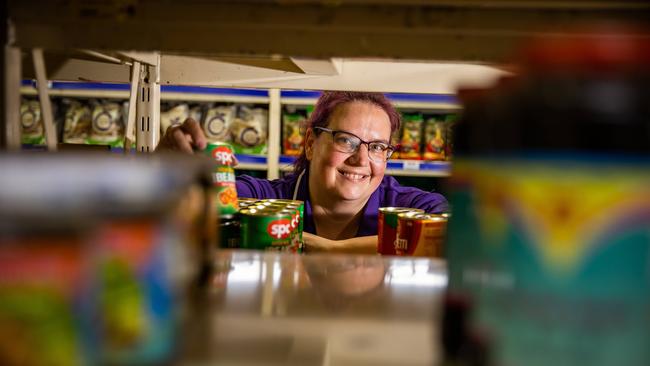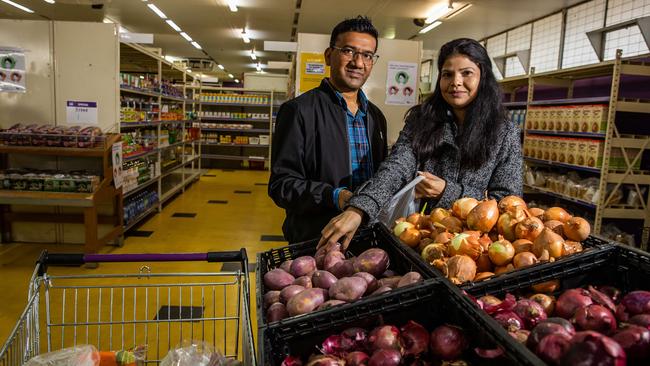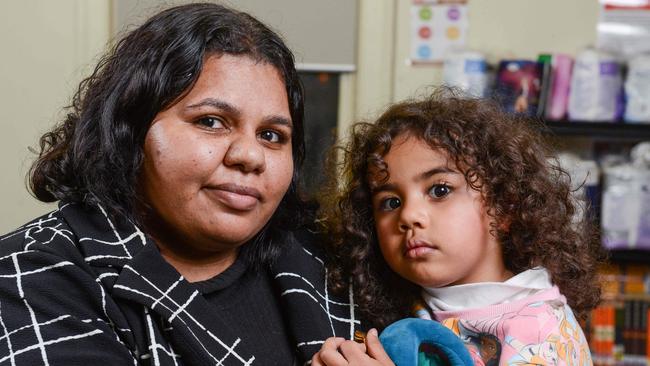Rising cost of living hitting families hard, even when people are employed
The rising cost of food, rent and fuel means people are scrambling to cover their basic needs, even if they are employed. How long would you last on the minimum wage?
SA News
Don't miss out on the headlines from SA News. Followed categories will be added to My News.
Kerry Engleson’s last $10 went into her fuel tank. And when petrol is selling for more than $2 a litre, that $10 is not going to get you far.
“The gauge didn’t move,’’ she remembers. “The numbers didn’t move and I went out of the petrol station bawling my eyes out.’’
Most weeks now, Ms Engleson runs out of money. A disability support pensioner with an adult son with autism, as well as a nine-year-old and an 11-year-old, she says it’s only been in the past couple of months that it’s become this bad.
“Even the shopping, because everything went up about $1 or two, that’s what seems like, but everything just went really expensive. I’ve got food in the house, but just not enough,’’ she says.
Some days the meals are toast or Weet-Bix. Old luxuries such as steak are a thing of the past, replaced by mince. Even cheap treats such as frozen pizzas for the kids are too expensive.
“I’m really struggling and you know … if I can just have a freezer meal in the freezer, at least the kids can help themselves but you know when you can’t even afford to do that, it’s just…’’ she trails off.
Ms Engelson, 43, is far from alone in feeling the pinch. Charities such as Foodbank, AnglicareSA and Puddle Jumpers are all reporting massive increases in demand. The reasons are easy enough to pinpoint. Prices are rising at their fastest level in 20 years. Food prices are soaring, petrol costs are at record highs, rents are skyrocketing. At the same time, real wages are going backwards as are support payments such as JobSeeker. And economists are predicting prices will just keep going up.
In fighting the last election, the Morrison government made much of the strength of the economy and the lowest unemployment rate in 40 years, yet there are many for whom life is harder than ever.
Kerry receives government payments of around $1500 a fortnight. Of that more than half, $820, goes to pay the rent and water on her Elizabeth North property.

We meet at the Foodbank at the Davoren Park Shopping Centre in Adelaide’s north. It’s Kerry’s first time visiting the Foodbank, which only opened in February, but is doing a roaring trade. Customers are referred to Foodbank by other charities who assess their clients as having trouble affording food. A voucher is issued that can be spent in the Foodbank, which has a wide range of food at cheap prices and free fruit and vegetables.
Foodbank’s Davoren Park hub manager Belinda Kean says she has seen a huge number of new customers. Ms Kean added that many of their customers have jobs, but are still struggling to make ends meet.
“Many people are saying the same thing, that they just can’t afford to feed themselves and their families the same way they used to be able to because they their bills are increasing, fuel is increasing, their grocery prices are increasing, and they don’t have anywhere to pull money from to pay for it,’’ she said.
Foodbank SA’s chief executive Greg Pattinson says the Davoren Park experience is being replicated across the state. The organisation has eight sites across the state as well as pop-up markets and mobile hubs. In an average year, Foodbank helps around 135,000 people, but Mr Pattinson says that number will rise by at least 20 per cent his year and even more in some areas, even though he estimates around 60 per cent of customers are in some form of employment.
Foodbank caters to all sorts. Pakistani refugees Samuel and Iram waited in Bangkok for eight years before being allowed into Australia two months ago. They are taking English classes and settling into a new life in Elizabeth Vale with their two children. They have been shocked by prices in Australia.
“The Foodbank is a good idea for that because sometime my kids want to buy something but we are not afford from the regular market because we don’t have that much money, so we came here to buy some stuff,’’ Iram says.

A new report by AnglicareSA illustrates just how difficult life can be, even with a full-time job. Anglicare estimates that a worker earning the minimum wage of $772.60 a week would have $198 a week left over after paying for rent, transport and food and drink. It calculated that a minimum wage worker in a single parent household would fall short by $92 a week and that a family with two minimum-wage workers and two children would have only $63 left over for all other expenses.
Nancy Penna, AnglicareSA’s general manager of community services, said there are a lot of people out there “on the edge of a crisis’’.
“We are seeing the tip of the iceberg that is associated with increased cost of living, whether it’s government support benefits or wages, or low wages that haven’t kept up,’’ she said.
Ms Penna said the shortage of rental accommodation means many are prioritising rent ahead of other bills. She said state and federal governments should do more to provide rent assistance.
“People are really scared that if they are fortunate to have a home that they are in, they are scared of losing it,’’ she said. Then other bills begin to mount and “they’ve been trapped in a cycle of debt’’.
Linikka (who did not want to give her surname) is a 25-year-old single mother who has a three-year-old daughter, Jamillah. Linikka lost her SA Health job last year after the funding for the program that employed her expired. She was unemployed until last month when she started as a human resources intern with oil and gas company Santos.
We meet at the Puddle Jumpers hub in Hindmarsh. It sits in the middle of Port Rd and is a friendly place that distributes fresh food, hot meals, clothes, nappies and even ugg boots. There are people living in cars in the nearby carpark, there is a mobile shower truck, while at other times there are mobile hairdressers and laundries on site.
During her eight months without a job, Linikka says life was very hard.
“There was times where I was very depressed because I didn’t know how I would survive the next week,’’ she says. “Most of the time, I was trying to borrow money from friends, so I can get nappies or wipes and food and it was very tough.’’

Bills and debt mounted, including one for an ambulance trip when Jamillah fell and cracked her head open. Linikka became reliant on organisations such as Puddle Jumpers and Foodbank to survive. But she says it’s not easy asking for help.
“It feels embarrassing asking for help, you don’t want people to see that side of you especially since you’ve been so tough for so long and so independent,’’ she says.
As an Indigenous women, Linikka felt she was also been judged and that people may view her as a bad mother.
“As an Aboriginal mother it’s quite frightening if you’re having to reach out to all of these people because you never know who’s watching. I feel like I’m feeling guilty that I can’t feed my child and who’s going to report me next.’’
Like Foodbank and AnglicareSA, Puddle Jumpers founder and chief executive Melanie Tate believes agencies such as hers, which operate on donations, also need more help. She says they are also losing volunteers who can’t afford to put petrol in the car at a time when demand is surging and other charities are referring people to Puddle Jumpers because they are already at capacity.
“I feel like it’s almost taking for granted some goodwill because throughout Covid, we worked seven days a week, 15-hour days just to keep food on the table because it was crisis point,” said Ms Tate.
“But we’re talking about crisis point, now; 2½ years later – we’re still doing it.’’
Originally published as Rising cost of living hitting families hard, even when people are employed


